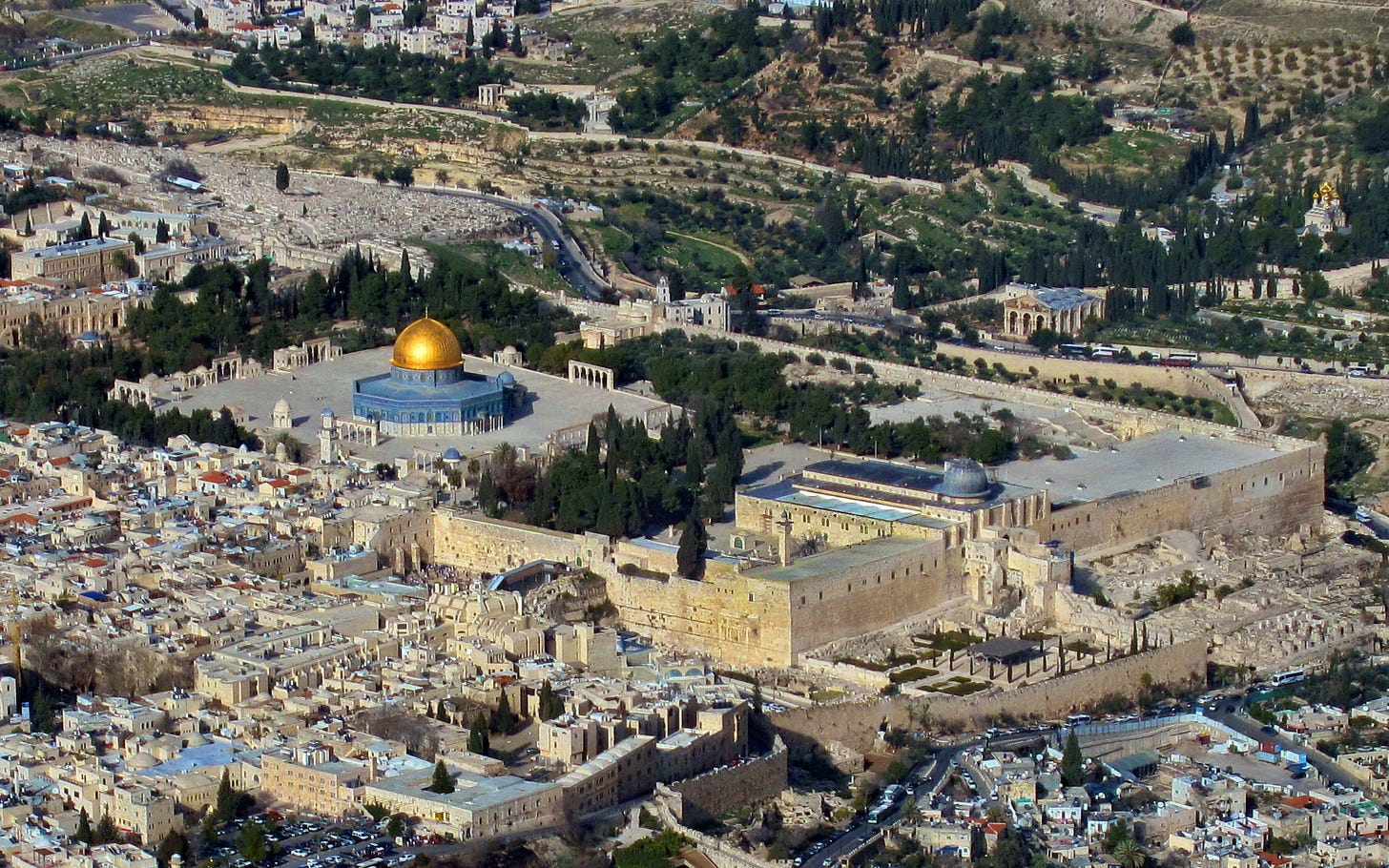While Hopefully Beneficial generally will not have weekly themes, there was one last week (America!) and one again this week (Israel!). Each of these countries are always in my heart, and I want peace and prosperity for both. Last Wednesday, we looked at Washington, D.C., and today, we are focused on Jerusalem.
There are a handful of places in the world that are unusually important, and have been so for a very long time; Jerusalem is one of these key locations that has been among the most sacred and desired places throughout human history. It is also deeply important to me personally. Jerusalem is the birthplace of my wife, Yael. It is where her mother, of blessed memory, was born shortly after her family arrived from Egypt, and also where her father moved as a boy to when his family was forced to leave Iran.
I must admit to being more than a little intimidated by the prospect of writing about this colossally complex, coveted, and dreamed of place, which is known by many names: the Holy City (Hebrew: עיר הקודש), Zion, the Holy Place (Arabic: القدس), the City of David, the City of Peace. For over half of the world’s population, this ancient and modern city has enormous religious significance. It is beloved by Jews, Christians, and Muslims alike.
For Jews, it is the holiest city, the location of the First and Second Temples, the home of the Western Wall (Hebrew: הכותל המערבי), the most sacred place for prayer, and the concluding blessing to the Passover and Yom Kippur services, “Next year in Jerusalem,” which expresses the deep longing for Jerusalem as both a physical and spiritual destination. For Christians, it is the site of the crucifixion, burial, and resurrection of Jesus, which are foundational to Christian belief. The Church of the Holy Sepulchre is the holiest place in Christianity, and Jerusalem has been the ultimate pilgrimage destination for Christians for nearly 1,700 years. For Muslims, only Mecca and Medina are holier. Jerusalem is where the Prophet Muhammad ascended into heaven and is home to the Dome of the Rock (Arabic: قبة الصخرة), the oldest surviving work of Islamic architecture.
It is also a city with a deep history of global conquest and has been captured and recaptured 44 times. Over 3,000 years ago, King David made Jerusalem the capital of the Kingdom of Israel after defeating the Jebusites, a Canaanite tribe. Subsequently, Jerusalem was ruled by the Babylonians under King Nebuchadnezzar II, the Persians under Cyrus the Great, the Greeks under Alexander the Great, the Jews under the Hasmonean dynasty, and the Romans under Herod the Great. It became a Christian city under Roman rule with Emperor Constantine's conversion, a Muslim city under Caliph Umar ibn al-Khattab, a Christian city again after the Crusades, a Muslim city again under the leadership of Saladin, an Ottoman city under Sultan Suleiman the Magnificent, a British city under General Allenby, a divided city (held by both Israel and Jordan), and then fully under Israeli control since 1967. Whew! This lightning round of history over millennia does no justice to the nuance and complexity of each period, but it does nicely highlight how treasured Jerusalem has been over time.
The first time I visited Jerusalem was with Yael, and as we drove through the Judean Mountains up towards the city, I could hardly believe that I would soon be in this legendary, almost mythical place that I’d learned about since childhood. Our first stop was Har HaMenuchot, the largest cemetery in Jerusalem, to visit her mother’s grave. Looking out over the towns and valley below, the sense of history was palpable, and I was reminded of the continuity of human life over millennia in this special place. Visiting the Old City and the Western Wall was a powerful, emotionally overwhelming experience. At one point, I simply needed to sit down due to sensory overload. In Jerusalem, there is an unmistakably and omnipresent energy in the air. The only other place I’d felt something similar was in Varanasi, the ancient Indian city that is sacred to Hindus, Buddhists, and Jains (which will be a post for another day). While Jerusalem and Varanasi are vastly different cities with dramatically different histories, there is a feeling of deep spiritual significance in both.
Jerusalem is a city that humbles and electrifies all at once. It is a place where ancient history cohabits with modern society. For me, it’s not only a crossroads of civilizations and faiths, but also the home of my family. Its distinctively colored stones carry the stories of prophets, empires, and prayers. To walk its timeless streets is to feel connected to something far larger than oneself, and to glimpse the possibility of what sacredness can mean in human life. Today, and every day, I pray for peace in the holy city of Jerusalem. May it be so.
And friends, that’s a wrap on post #8, only 2,492 to go. See you tomorrow with more from Hopefully Beneficial. Shalom and let’s keep going!





❤️